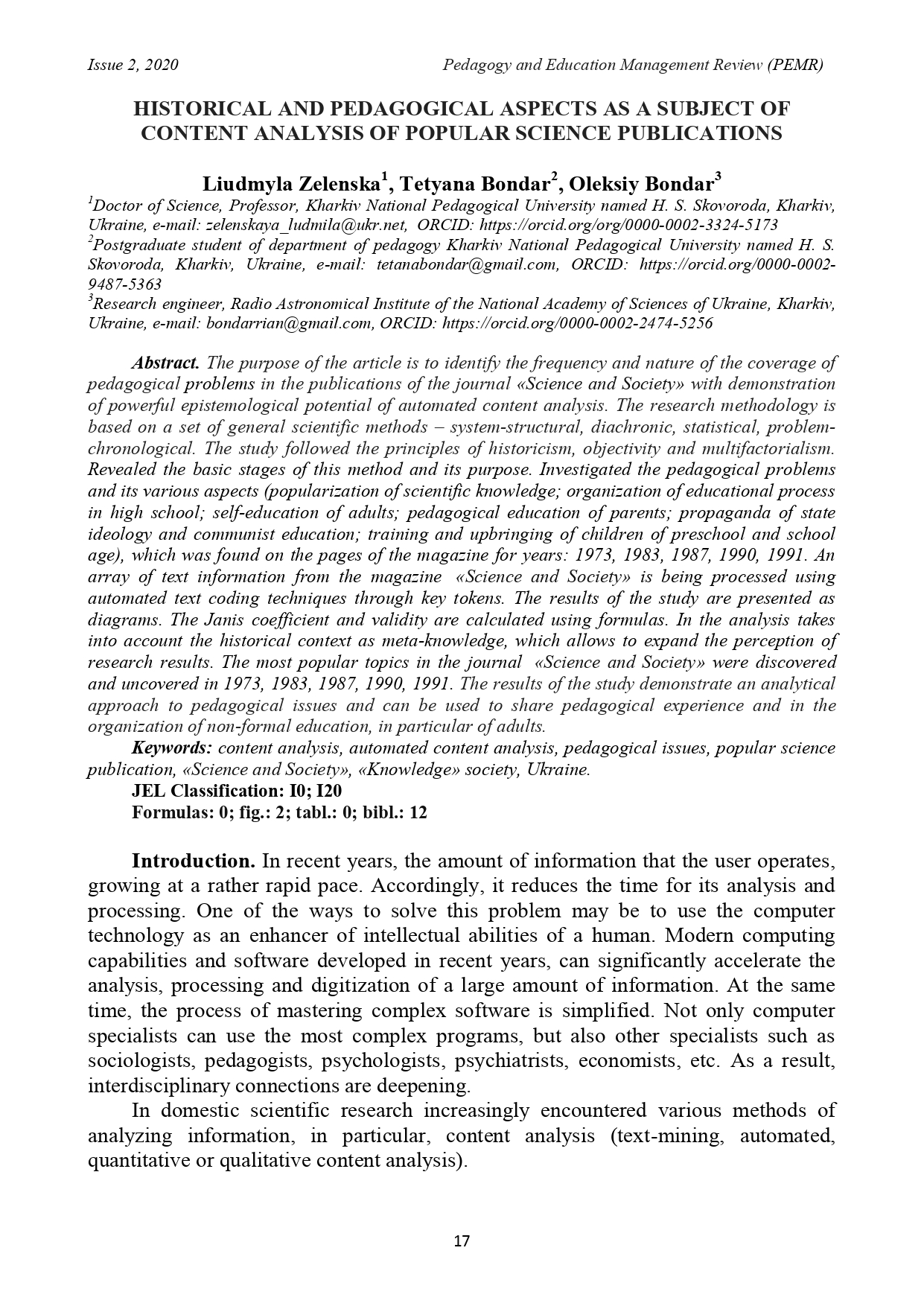HISTORICAL AND PEDAGOGICAL ASPECTS AS A SUBJECT OF CONTENT ANALYSIS OF POPULAR SCIENCE PUBLICATIONS
DOI:
https://doi.org/10.36690/2733-2039-2020-2-17Keywords:
content analysis, automated content analysis, pedagogical issues, popular science publication, «Science and Society», «Knowledge» society, UkraineAbstract
The purpose of the article is to identify the frequency and nature of the coverage of pedagogical problems in the publications of the journal «Science and Society» with demonstration of powerful epistemological potential of automated content analysis. The research methodology is based on a set of general scientific methods – system-structural, diachronic, statistical, problem-chronological. The study followed the principles of historicism, objectivity and multifactorialism. Revealed the basic stages of this method and its purpose. Investigated the pedagogical problems and its various aspects (popularization of scientific knowledge; organization of educational process in high school; self-education of adults; pedagogical education of parents; propaganda of state ideology and communist education; training and upbringing of children of preschool and school age), which was found on the pages of the magazine for years: 1973, 1983, 1987, 1990, 1991. An array of text information from the magazine «Science and Society» is being processed using automated text coding techniques through key tokens. The results of the study are presented as diagrams. The Janis coefficient and validity are calculated using formulas. In the analysis takes into account the historical context as meta-knowledge, which allows to expand the perception of research results. The most popular topics in the journal «Science and Society» were discovered and uncovered in 1973, 1983, 1987, 1990, 1991. The results of the study demonstrate an analytical approach to pedagogical issues and can be used to share pedagogical experience and in the organization of non-formal education, in particular of adults.
Downloads
References
Bushina, M., Gurzhiya, O. (2016), Istoriia Ukrainy [History of Ukraine], Cherkasy: CHDTU, 644 p. [in Ukrainian].
Denusova, S. (2014), Dyskusiinyi analiz yak sposib rekonstruktsii sotsialno-kulturnykh fenomeniv u khudozhnomu teksti [A discursive analysis as a way of reconstracting socio-cultural phenomena in the artistic text], Visnyk Kyivskoho natsionalnoho linhvistychnoho universytetu – Bulletin of the Kiev National Linguistic University, 17 (2), 57–64. [in Ukrainian].
Devi B Prasad (2008), Content analysis: A method of Social Science Research. Research Methods for Social Work, India: Rawat Publicashins [in English].
Elo, S., Kyngäs, H. (2008), The qualitative content analysis process. Journal of Advanced Nursing , 62(1), pp. 107–115 [in English].
Gavora, P. (2015), The State-of-the-Art of Content Analysis. Journal of Education Scients, 1, pp. 6–18. (retrieved from http://nevelestudomany.elte.hu/index.php/2015/04/the-state-of-the-art-of-content-analysis/?lang=en) [in English].
Ivanov, O. (2013), Klasychnyi kontent-analiz ta analiz tekstu: terminolohichni ta metodolohichni vidminnosti [Classical content analisis and analisis of the taxt: terminological and methodological distinctions]. Visnyk Kharkivskoho natsionalnoho universytetu imeni V. N. Karazina – Bulletin of the VN Karazin Kharkiv National University,1045 (30), 69–74. [in Ukrainian].
Krippendorf, K. (2004). Content Analysis. An introduction to Its methodology. Thousand Oaks, Califirnia, USA: Sage Pulications [in English].
Marsh, E. E. (2002), Rhetorical relationships between images and text in Web pages. Unpublished doctoral dissertation, University of Maryland at College Park, Maryland [in English].
Popping, R. (2000). Computer-assisted text analysis. London, UK: SAGE [in English].
Satu, E. & Kyngäs, H (2008), The qualitative content analysis process. Journal of Advanced Nursing, 62 (1). (retrieved from https://doi.org/10.1111/j.1365-2648.2007.04569.x) [in English].
Shapiro, G., Markoff, J. (2009), A matter of definition. In C. W. Roberts (Ed.), Text analysis for the social sciences, New York, NY: Routledge [in English].
Schrodt, P. A., (1996), KEDS (Kansas Event Data System) [computer software], Lawrence: Department of Political Science, University of Kansas.
Schrodt, P. A. (2000), TABARI 0.5.1 (Textual Analysis By Augmented Replacement Instructions) [computer software]. Lawrence: Department of Political Science, University of Kansas [in English].
Smolij, V. G. (Ets.). (2005), Entsyklopediia istorii Ukrainy [Encyclopedia of the History of Ukraine]. (3nd., Vols. 672), Kyiv: Naukova dumka. [in Ukrainian]
White, M., March, E. (2006), Content Analysis: A Flexible Methodology. Library Trends: Research Methods, 55 (1). (retrieved from https://www.ideals.illinois.edu/handle/2142/3654) [in English].






